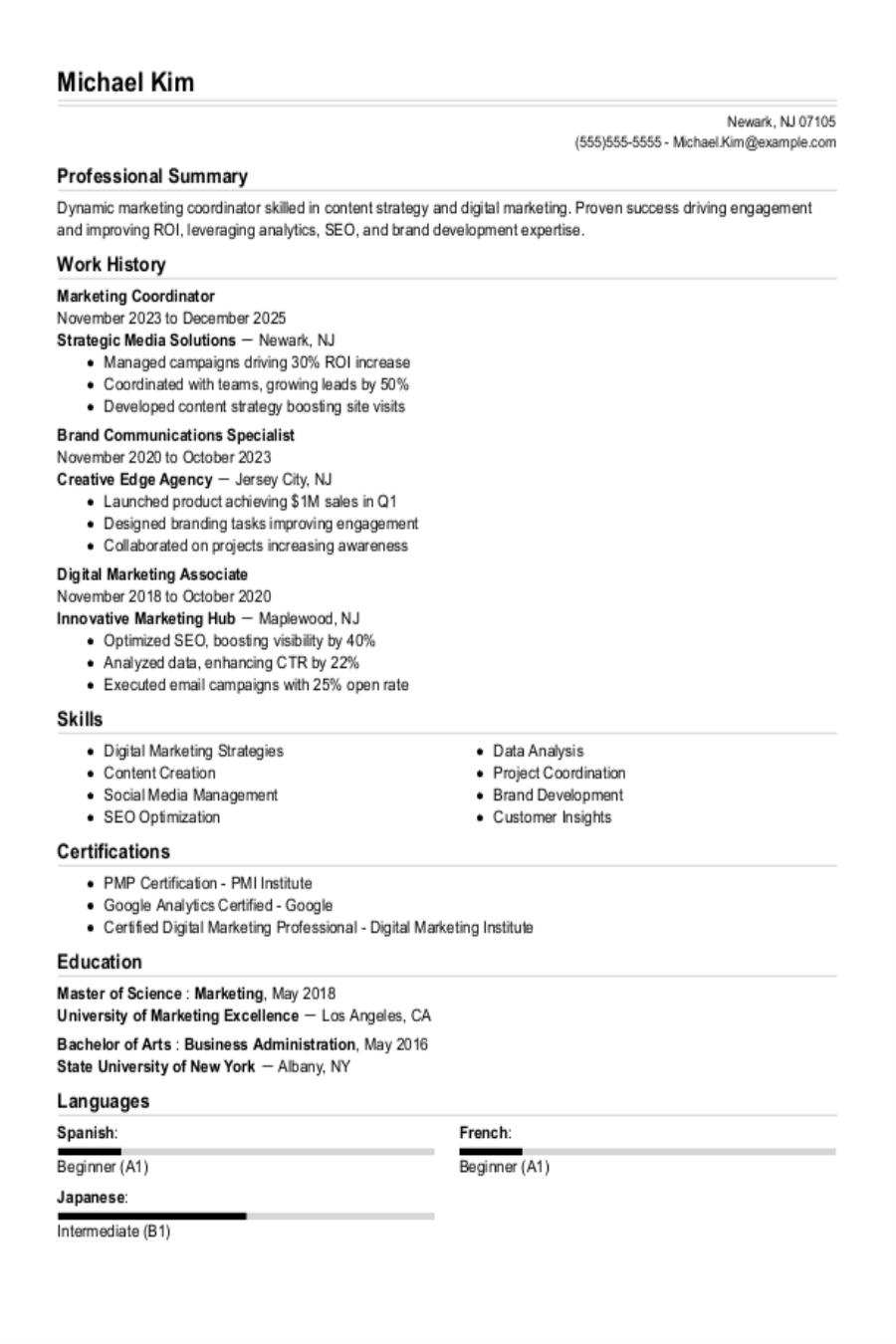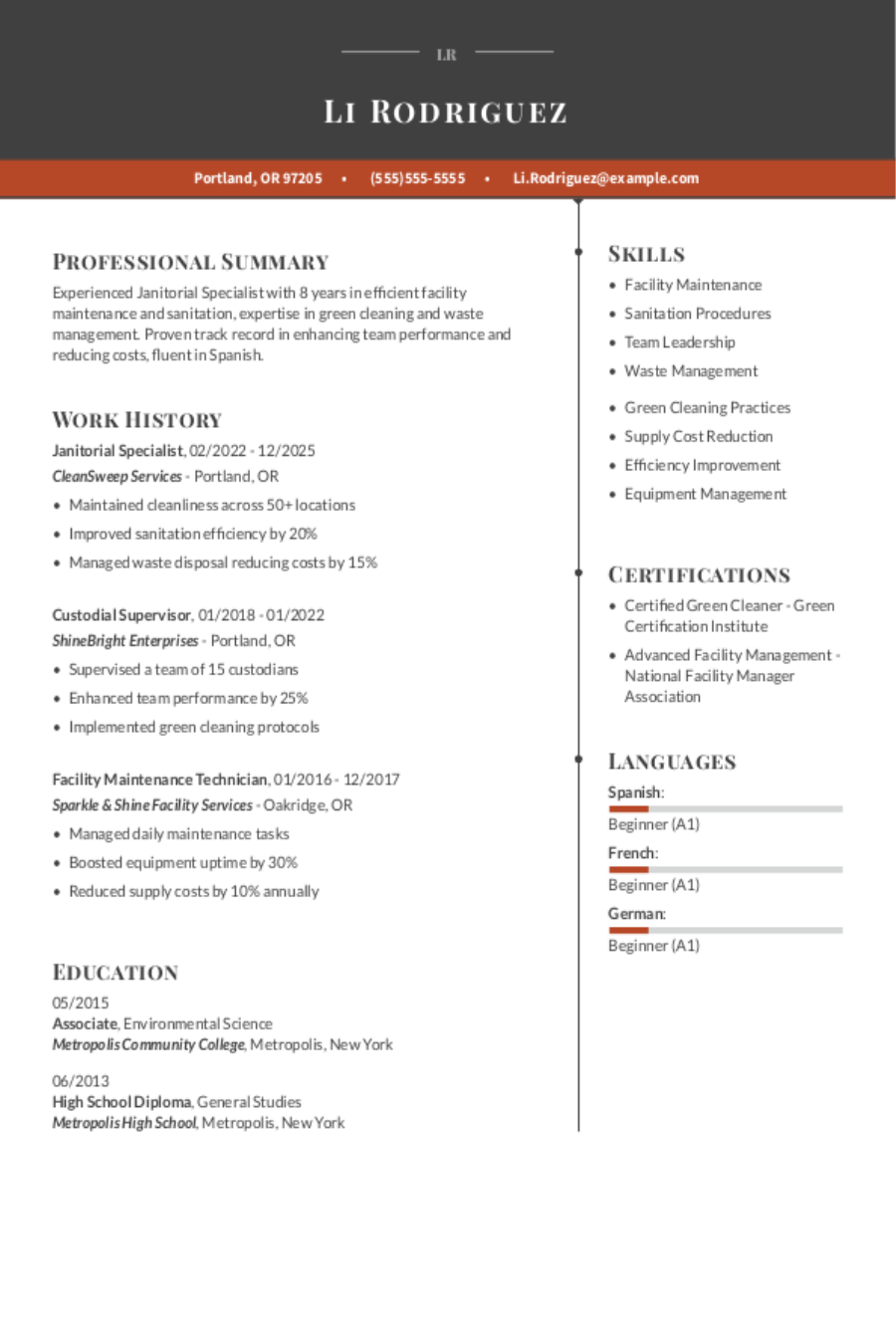Table of contents
Popular Technical Project Manager Resume Examples
Entry-level technical project manager resume
An entry-level resume for a technical project manager should focus on relevant coursework, certifications, technical skills, and any leadership roles in projects to highlight potential and adaptability.
Emphasizes soft skills: This resume highlights the job seeker's strong soft skills, such as leadership and problem-solving, which significantly mitigate their limited experience. For example, managing multiple projects simultaneously showcases their ability to drive results under pressure.
Showcases education: This resume builds the candidate’s credibility by placing a strong focus on their educational background, prominently featuring education so that the candidate's limited experience is not the resume's focal point.
Mid-career technical project manager resume
A mid-career technical project manager's resume should emphasize a mix of leadership experience, technical skills, and strategic project successes to highlight professional growth and adaptability in the field.
Encourages quick scanning: Clear layout highlights key achievements, making it easy to see the job seeker's expertise in managing cross-functional teams and optimizing processes for timely project completion.
Employs active language: Using action verbs such as "led," "optimized," and "implemented" highlights a proactive approach and shows significant contributions to project outcomes and efficiency.
Experienced technical project manager resume
A resume for a technical project manager should highlight successful project completions and leadership skills that clearly illustrate career advancement.
Follows traditional format: The chronological resume format effectively emphasizes the extensive experience of the job seeker, enabling clear visibility into their career growth and the impact of their project management roles over time.
Quantifies achievements: Quantifiable achievements provide clarity and impact to a job seeker's accomplishments. By showcasing specific metrics, such as cost savings or project delivery rates, job seekers can effectively demonstrate their value and improve understanding for recruiters.
No experience technical project manager resume
A resume for an applicant with no experience should highlight transferable skills, relevant coursework, and any leadership roles in projects or extracurricular activities to showcase the job seeker's potential.
Overcomes lack of work history: Highlighting strong organizational and leadership skills illustrates the job seeker's ability to effectively manage projects, making them a promising applicant for an entry-level technical project manager role.
Draws from diverse experiences: Including extracurricular activities and volunteer work on a resume highlights leadership, teamwork, and organizational skills, which are important for success in project management roles.
More resume examples
Technical Project Manager Resume Template
Looking to create a standout application? This technical project manager resume template serves as a solid foundation—just personalize it with your unique details and experiences.
Aya Nakamura
Lakeside, CA 92041
(555)555-5555
Aya.Nakamura@example.com
Professional Summary
Experienced Technical Project Manager with a track record of managing multi-million dollar projects, improving efficiency by up to 25%, and delivering solutions ahead of schedule. Skilled in Agile methodology, budget management, and team leadership.
Work History
Technical Project Manager
InnovateTech Solutions - Lakeside, CA
January 2023 - October 2025
- Managed projects worth $2M+ yearly
- Improved team efficiency by 25%
- Delivered solutions ahead of schedule
IT Project Coordinator
Visionary IT Services - San Diego, CA
January 2021 - December 2022
- Coordinated 10+ IT projects
- Enhanced budget controls by 15%
- Facilitated client communications
Project Analyst
TechAdvantage Inc. - Riverside, CA
January 2020 - December 2021
- Analyzed project data trends
- Reduced project costs by 12%
- Supported strategic decisions
Skills
- Project Management
- Agile Methodology
- Risk Assessment
- Budget Management
- Team Leadership
- Stakeholder Communications
- Process Improvement
- Resource Allocation
Education
Master's Computer Science
Stanford University Stanford, California
December 2019
Bachelor's Information Technology
University of Illinois Urbana-Champaign, Illinois
December 2017
Certifications
- Certified ScrumMaster (CSM) - Scrum Alliance
- Project Management Professional (PMP) - Project Management Institute
Languages
- Spanish - Beginner (A1)
- Mandarin - Beginner (A1)
- German - Intermediate (B1)
Must-Have Skills on a Technical Project Manager Resume
A strong skills section is vital for showcasing your qualifications and attracting the attention of hiring managers.
Project and process management professionals ensure initiatives move forward smoothly and systems function effectively. The skills you highlight should reflect your role in supporting goals and maintaining momentum. You resume is an opportunity to demonstrate how you help create order and drive successful outcomes.
The following data highlights the most sought-after hard and soft skills for technical project managers based on Resume Now’s internal resume analysis.
When you’re ready to improve your resume with relevant skills, try our AI Resume Skills Generator. It provides tailored suggestions according to your job title, ensuring a comprehensive skill set that stands out.
Writing Your Technical Project Manager Resume
Having explored these compelling resume examples, you are now prepared to dive into the process of crafting your own. We'll walk you through every aspect of how to write a resume, ensuring you understand each section thoroughly.
List your most relevant skills
An effective skills section on your technical project manager resume should highlight both your technical competencies, such as agile methodologies and software development life cycle (SDLC) knowledge, alongside essential soft skills like leadership and communication. This balance demonstrates that you can manage projects efficiently and work collaboratively with teams.
Pay close attention to keywords from the job listing. Incorporating these terms not only aligns your skills with what employers are seeking but also aids in passing through applicant tracking systems (ATS). By doing this, you present yourself as a strong job seeker who understands the technical project manager role and its requirements.
Example of skills on a technical project manager resume
- Proficient in Agile methodologies and project management tools like Jira and Trello
- Adept at coordinating cross-functional teams to achieve project goals
- Strong communicator with the ability to convey technical concepts clearly
- Analytical thinker with a focus on problem-solving and process improvement
Highlighting your soft skills on your resume can set you apart. Employers value interpersonal abilities because they are often difficult to teach, and showcasing these qualities can demonstrate your potential to thrive in a team environment.
Highlight your work history
Your work experience section should highlight your achievements and demonstrate how you've effectively applied your skills in various projects. Focus on specific outcomes and contributions that illustrate your impact, using relevant keywords to catch the attention of hiring managers.
Each job entry should include essential details such as your job title, the name of the employer, and the dates you were employed. This information provides context to your experience and helps employers evaluate your background quickly.
Example of a technical project manager work experience entry
- Technical Project Manager
Tech Innovations Inc. - San Francisco, CA
January 2021 - Present - Lead cross-functional teams to deliver complex technical projects on time and within budget, achieving a 20% reduction in project delivery timelines
- Facilitate agile ceremonies including sprint planning and retrospectives, fostering collaboration that improved team productivity by 30%
- Develop comprehensive project plans incorporating risk management strategies that decreased project risks by 25%
- Mentor junior project managers and interns, improving their skills in stakeholder management and technical documentation
- Use project management software to track progress and report status updates, ensuring transparency across all levels of the organization
Aim for clarity and impact in your bullet points. Focus on specific accomplishments and outcomes, using concise language that highlights your contributions without unnecessary elaboration.
Include your education
The education section of your technical project manager resume should present your degrees and diplomas in reverse-chronological order starting with your most recent qualification. Include all relevant degrees while excluding your high school diploma if you hold a higher degree such as a bachelor's or master's.
If you are currently enrolled in a program or have incomplete education, make sure to list your highest completed level along with an anticipated graduation date. You can also include bullet points detailing key coursework or academic achievements that relate to project management and technology.
Common certifications for a technical project manager resume
- Project Management Professional (PMP) – Project Management Institute (PMI)
- Certified ScrumMaster (CSM) – Scrum Alliance
- Agile Certified Practitioner (PMI-ACP) – Project Management Institute (PMI)
- PRINCE2 Practitioner – AXELOS
Sum up your resume with an introduction
Creating an effective profile section on your resume is important, as it serves as your first impression with potential employers. A well-crafted profile can succinctly convey your strengths and set the tone for the rest of your application.
If you’re an experienced applicant, a professional summary is the best choice for your profile. This format allows you to showcase notable achievements and relevant experiences right at the top of your resume. If you're short on experience, try writing a resume objective that underlines your career ambitions.
Professional summary example
Driven technical project manager with over 8 years of experience in leading cross-functional teams to deliver complex technology solutions. Demonstrated success in improving project workflows, managing budgets efficiently, and ensuring alignment with business objectives. Highly proficient in Agile methodologies, risk management, and stakeholder communication.
Resume objective example
Enthusiastic technical project manager eager to apply strong analytical skills and effective communication abilities to drive successful project outcomes. Looking to improve team collaboration and streamline processes, while leveraging a solid foundation in project planning and stakeholder engagement to support organizational goals.
As a technical project manager job seeker, keep your resume profile concise and focused. Aim for no more than three sentences to highlight your key qualifications and experiences. You can effectively convey any additional details in your cover letter to provide deeper insight into your expertise.
Add unique sections to set you apart
Optional resume sections can highlight your unique qualifications as a technical project manager. These additional segments allow you to present skills and experiences that set you apart from other job seekers.
Including hobbies and volunteer work in these sections reveals different dimensions of your professional identity. This approach not only showcases relevant skills but also reflects your values, commitment, and ability to work collaboratively. By sharing what you’re passionate about outside of work, you create a more comprehensive picture of yourself, demonstrating how your personal interests align with the demands of the role.
Three sections perfect for a technical project manager resume
- Technical Skills: As a technical project manager, showcasing your technical skills is important. They demonstrate your capability to manage complex projects and lead teams effectively.
- Tools and Platforms: In today's fast-paced environment, technical project managers must be adept with various computer skills. Highlight your skill in project management software, collaboration platforms, and data analysis tools to improve team efficiency and project success.
- Professional Certifications: Certifications validate your expertise in technical project management. They improve your skills, improve career prospects, and showcase your dedication to professional growth in an ever-evolving field.
5 Resume Formatting Tips
- Choose a format that matches your career stage.
Choosing the right resume format is important for showcasing your experience. A chronological layout is ideal if you have extensive work history, as it highlights your growth effectively. For individuals with less experience, a functional design places more emphasis on skills rather than job titles. Many professionals find that a combination approach provides a balanced way to present their qualifications.
- Pick a smart resume template.
Using a professional resume template improves readability and helps your key achievements stand out. A well-structured layout guides the reader's eye, making it easier for hiring managers to quickly find important information. Select a template that is clean and ATS-friendly to ensure your resume passes through screening software.
- Select an appropriate font.
Choose a clean professional font to make your resume easier to read. Fonts like Helvetica, Georgia, or Verdana are widely accepted and help ensure clarity for both applicant tracking systems and hiring managers.
- Use consistent formatting.
Ensure your resume has uniform left alignment and evenly spaced margins to improve readability and create a polished, professional look.
- Keep your resume to one or two pages.
Remember, while resumes should be one page long to maintain focus, if you have extensive experience, a two-page resume is acceptable. Just ensure every detail is relevant and adds value.
Tools for Your Job Search
Are you preparing to apply for that technical project manager role you've been eyeing? Before you hit send on your application, take advantage of our ATS Resume Checker. This essential tool provides insights into how well your resume will perform with the automated systems used by many tech companies for initial applicant screening.
Looking to improve your resume further? Our AI Resume Builder delivers personalized recommendations tailored to your specific project management background, complete with professionally designed templates that help showcase your skills and achievements effectively.
Frequently Asked Questions
Last Updated: October 22, 2025
Yes. A cover letter is important as it provides context to your resume and offers an invaluable chance to communicate directly with potential employers. It allows you to express your enthusiasm for the role and highlight how your unique experience makes you the perfect fit. Take this opportunity to write a cover letter that improves your application.
For a quick solution, try our AI Cover Letter Generator. This tool helps you create a personalized, effective cover letter in just minutes. You can also choose from various cover letter template options that perfectly align with your resume, ensuring a professional presentation of your skills and achievements.
Understanding the difference between a CV and a resume is important. Resumes are brief, usually one to two pages, focusing on your skills and recent job experiences. In contrast, CVs are more extensive documents that can span multiple pages, detailing your academic background, research contributions, publications, and comprehensive professional history.
When applying for positions in academia or specialized fields like law, a CV is often required. If you're unsure which document to use or need assistance creating an impressive CV quickly, try our online CV Maker. It offers various CV templates tailored for different industries and career levels—perfect for making a standout impression in minutes.
An active LinkedIn presence is important for a technical project manager's job search. It helps expand your professional network and effectively showcases your skills to potential employers.
Practice answering job interview questions and answers commonly asked in technical project manager interviews. This preparation will boost your confidence and equip you to navigate any surprises that may arise during the interview.
Technical project managers often begin their careers as project coordinators or assistants. With experience and relevant certifications, they can advance to senior project manager roles or transition into program management.
Was this information helpful? Let us know!
Hailey is a career advice writer dedicated to helping job seekers excel in their careers.
More resources

63% Expect AI’s Role in Compensation to Grow Significantly in the Next 5 Years
Resume Now s latest report examines how workers are responding...

How to Include Research Skills on a Resume: 40+ Examples
Check out our guide to understand what research skills are and...

How To Write a CV: The Ultimate Guide for 2025
Here is a complete and comprehensive guide to writing a CV ev...




